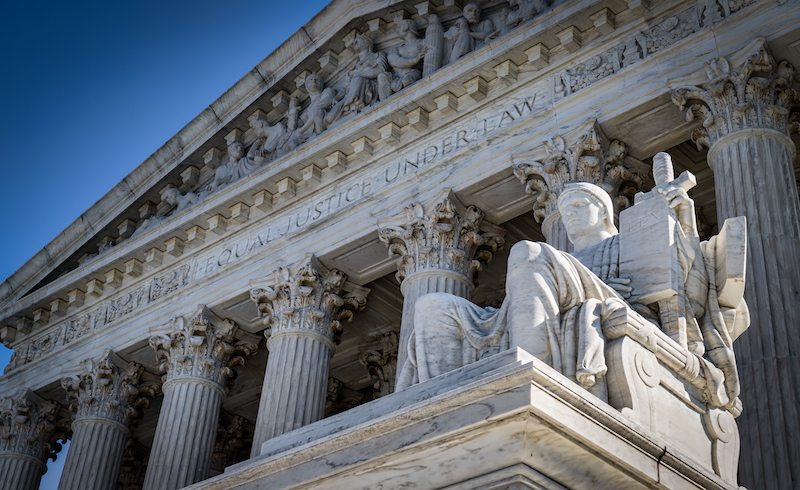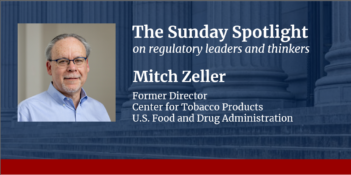
Scholars and practitioners discuss the Court’s most significant regulatory decisions of the last term.
After its recently concluded term, the U.S. Supreme Court finds itself more in the public spotlight than it has in many years, with protestors organizing in front of the Court, across the nation, and even outside Justices’ homes.
This strong public reaction follows from the Court having decided cases that have considerable impacts on administrative law, regulation, and the rights of everyday people. The Court’s opinions this term addressed a range of controversial issues, including abortion, climate change, immigration policy, gun rights, elections, religion, and healthcare, as well as questions about judicial deference to agency decision-making and the scope of agencies’ authority over major policy questions.
The Court’s 2021-2022 term was its third conducted during the COVID-19 pandemic. It was also the final term for Justice Stephen Breyer, who has now retired from the bench after serving on the Court for 28 years.
The Regulatory Review has invited leading scholars with a diverse range of backgrounds to comment on the Court’s major regulatory decisions from the recent term. Their essays aim to provide insight and analysis about the impacts of these decisions from the Court’s term.
Among the contributors to this series are: Allison Hoffman, University of Pennsylvania Law School; Hillel Levin, University of Georgia School of Law; Timothy D. Lytton, Georgia State University College of Law; Randolph May, Free State Foundation; Richard J. Pierce, George Washington University Law School; Ciara Torres-Spelliscy, Stetson University College of Law; Shoba Sivaprasad Wadhia, Penn State Law; Shelley Welton, University of Pennsylvania Law School; and Tobias Wolff, University of Pennsylvania Law School.
Constitutional Commitments to Aspirational Principles
July 11, 2022 | Tobias Barrington Wolff, University of Pennsylvania Law School
The majority’s reasoning in Dobbs v. Jackson Women’s Health entrenches the historical failures of the United States.
A Dangerous, Even if Expected, Opinion on Climate
July 12, 2022 | Shelley Welton, University of Pennsylvania Law School
The Supreme Court casts a shadow across the regulatory state in opinion limiting EPA’s ability to fight climate change.
Firearms Regulation through Constitutional Litigation
July 12, 2022 | Hillel Y. Levin, University of Georgia School of Law, and Timothy D. Lytton, Georgia State University College of Law
The Supreme Court applies a contested history of firearm regulation to evaluate the constitutionality of firearm restrictions.
Court Allows Administration to End “Remain in Mexico”
July 13, 2022 | Shoba Sivaprasad Wadhia, Penn State Law
DHS has discretion to end its policy requiring noncitizens to wait in Mexico pending their immigration proceedings.
Is Chevron Deference Still Alive?
July 14, 2022 | Richard J. Pierce, Jr., George Washington University Law School
Three takeaways follow from the Supreme Court’s recent opinions ignoring Chevron v. NRDC.
A Major Ruling on Major Questions
July 15, 2022 | Randolph May, Free State Foundation
In West Virginia v. EPA, the Supreme Court cements the major questions doctrine and strengthens the separation of powers.
A Review of Health Care in the Court
July 18, 2022 | Allison Hoffman, University of Pennsylvania Law School
Several U.S. Supreme Court cases from this past term have significant implications for the provision of medical care.
Nostalgia for Agency Expertise
July 19, 2022 | Richard J. Pierce, Jr., George Washington University Law School
Agencies are increasingly taking politically motivated actions in areas outside their core expertise.
Supreme Court Crushes the United States’ Ability to Mitigate Climate Change
July 20, 2022 | Richard J. Pierce, Jr., George Washington University Law School
Rejecting EPA’s ability to reshape the coal industry, the Court forecasts invalidating future agency actions.
The Supreme Court Wants Legislators as Defendants but Not as Plaintiffs
July 21, 2022 | Ciara Torres-Spelliscy, Stetson University College of Law
The Supreme Court’s increased potential intervening defendants when it implicitly protected voter ID laws.



